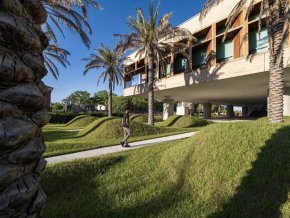
Pilgrimage and progress

On a gray morning in late May 2023, a small group of students, faculty and alumni set out from Lutheran Theological Southern Seminary (LTSS) in Columbia, S.C. bound for Charleston on a pilgrimage uniting justice, hope, history and faith.
“Pilgrimage represents both a physical journey and an interior journey of transformation and change,” shared the Rev. Dr. Melanie Dobson, assistant professor and the Lefler and Wohltman Chair in Methodist Studies. “It’s a profound Christian formative practice with the power to meet our spiritual hungers as we step out into the world to encounter God.”
Columbia, South Carolina
In the Maymester 2023 session at the seminary, Dobson offered a new course called “Pilgrimage of Justice and Hope,” a course designed to draw necessary connections between local communities, the past and present of racial injustice in the United States and the role of faith and ministry in bridging divides to facilitate progress and connection.
Early in the course, students visited locations around Columbia, including sites in the Eau Claire neighborhood near the LTSS campus, the Mann-Simons Site — a home and workplace owned and operated by a single Black family from 1843-1970 — and the home of civil rights activist Modjeska Monteith Simkins.
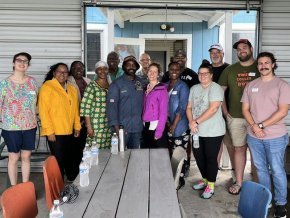
“We visited historical sites, and we engaged with the local community, looking at schools and what gentrification has done in Eau Claire. We visited a health clinic and looked at health disparities for African Americans. None of those issues are unique to Columbia,” shared the Rev. Dr. Evelyn Fulmore, a doctor of pharmacy and minister at Warren Chapel United Methodist Church in Lynchburg, S.C. “It’s both an internal journey and a learning experience I can take into my ministry, caring for God’s children.”
The International African American Museum
As the final journey of the course, the pilgrimage to Charleston took students to sites significant to the African-American experience, starting at the International African American Museum (IAAM) located at the historical site of Gadsden’s Wharf, where an estimated 100,000 enslaved Africans who survived the Middle Passage landed in North America. Slated to open to the public on June 27, the museum is both a historical exhibit and a memorial site.
“The designers of the museum elevated the building on pillars, a conscious decision to honor the sacredness of the ground that enslaved Africans walked on as they began a horrific life in the Americas,” said Tiffany Knowlin Boykin, pastor at Wesley United Methodist Church in Columbia.
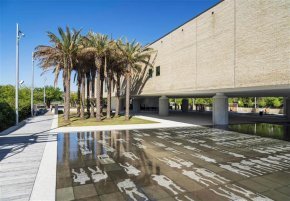
That ground is now home to the African Ancestors Memorial Garden, a space to reflect on the significance of the events that took place on this land and the lives lost or damaged in the transatlantic slave trade. A compelling feature of the gardens is the Tide Tribute, a pool of water that fills and empties with the changing tides.
“At the belly of the foundation of the museum are these images of human bodies that represent the men, women and children in the bellies of ships brought to South Carolina, and in that display, you see the water from the tides running over those images,” Terry Phillips, a Master of Theological Studies (MTS) student and director of multicultural affairs at Lenoir-Rhyne, explained. “Standing in the geography, the space of this history, was overwhelming.”
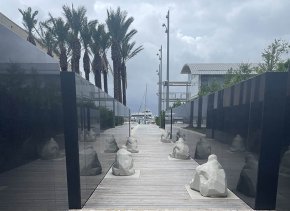
The purpose of a pilgrimage is to experience the emotional power of place, and the space surrounding the museum tapped into the injustices associated with the land and the hope running through the students visiting the space.
“From the garden we walked through the space where a warehouse was, where 800 people just died one night because bad weather came while they were being stored there. In that sacred space, we were able to sing. The song that came into my heart was ‘I Don’t Feel No Ways Tired,’” shared Fulmore.
The pilgrimage continues
After visiting IAAM, the pilgrims visited other significant sites in the Charleston area, including the Moving Star Praise House — a structure built in 1917 that served as a center of the island’s Gullah Geechee culture — the McLeod Plantation Historic Site, and Fields Farm on John’s Island. The pilgrimage finished at the Mother Emanuel African Methodist Episcopal Church, site of a mass shooting in 2015.
“It was very sobering to visit Emanuel AME church, eerie to stand in the space where nine people were slain, but it was also a great reminder of the work that remains necessary regarding racism and reconciliation,” said Knowlin Boykin.
The final assignment of the course asked students to develop their own pilgrimage, and Phillips hopes to bring the transformative experience both to the church where he ministers in Conover, N.C. and to students at Lenoir-Rhyne.
“There’s work to be done, but I’ve found a lot of hope in the journey with this class,” he shared. “I talked to people of like origin to me, and I talked to people who had different experiences. We had to learn to communicate together. Sometimes these conversations are uncomfortable, but we need more of them. People need to have a voice — that’s what makes progress possible.”
Dobson designed the class to facilitate these discussions and give a model for the students to use in ministry and life.
“Effective ministry requires us to engage with congregations and communities in the social, cultural, historical and spiritual contexts where they are. In the current climate in the United States, it is important to understand the history of racial injustice as well as the resilience and advocacy of human rights work. The church has a role to play in that work.”
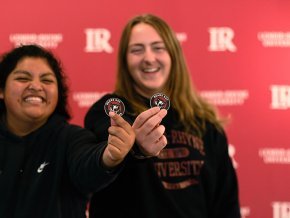
Lenoir-Rhyne celebrates the success of Giving Tuesday, an annual global giving movement for the causes and organizations we care most about.
View More
Public health major Jocelyn Florez '25 shares her passion for evaluation, prevention and protection as she does her part to build healthier communities.
View More